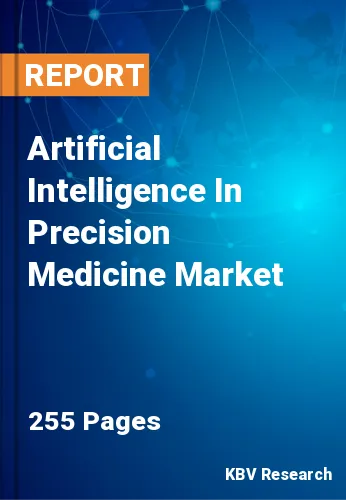
The Global Artificial Intelligence In Precision Medicine Market size is expected to reach $6.3 billion by 2028, rising at a market growth of 32.6% CAGR during the forecast period.
Precision medicine, also referred to as "personalized medicine," is a cutting-edge strategy for customizing illness prevention and treatment that considers variations in people's genes, lifestyles, and environments. Targeting the appropriate medications to the appropriate patients at the appropriate times is the aim of precision medicine.
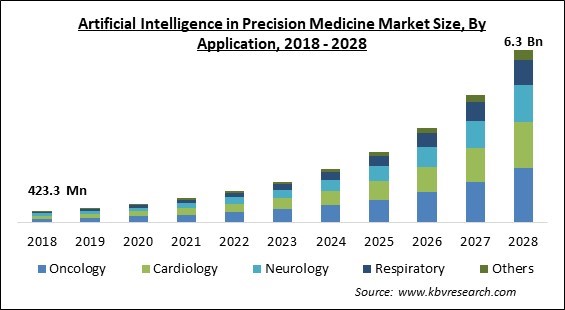
Precision medicine has already produced significant new findings and FDA-approved therapies that are tailored to a person's unique traits, such as their genetic makeup or the genetic profile of their tumor. Molecular testing is frequently administered to patients with different types of cancer as part of patient care, allowing medical professionals to choose therapies that raise survival rates and lower the risk of side effects.
The market for precision medicine is developing due to the increasing R&D expenditures and increased demand for customized drugs. Collaboration amongst important businesses is further propelling the industry's growth.
As an illustration, in August 2022, Sanofi and Atomwise reached an agreement for USD 20 million, and Sanofi planned to utilize Atomwise's AtomNet system for research and computational discovery study on up to five therapeutic targets. The platform incorporates deep learning-based components for the structure-based designing of pharmaceuticals through quick, AI-powered searches of the company's exclusive library of more than three trillion synthesizable complexes.
A number of healthcare services, notably precision population health, medicine, chronic illness management, and medical imaging, have been improved because of the applications of AI. The COVID-19 management's usage of artificial intelligence has sped up market growth. For instance, a team from the Johns Hopkins School of Public Health used artificial intelligence to produce a COVID-19 mortality risk calculator. This calculator used artificial intelligence to direct public health campaigns that included preventative tools like N-95 masks. Additionally, AI was used to distribute limited resources and establish treatment priorities for COVID-19 patients. A group of researchers from the General Hospital of the People's Liberation Army in Beijing, China, developed an online triage tool model to manage suspected COVID-19 pneumonia in adult patients.
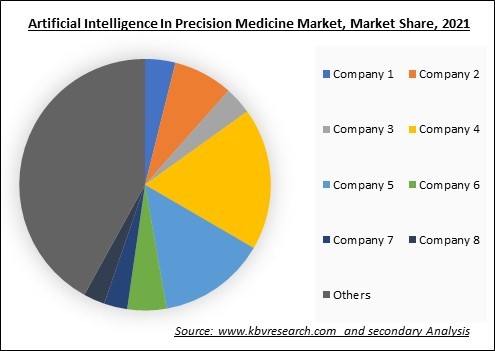
The leading players in the market are competing with diverse innovative offerings to remain competitive in the market. The below illustration shows the percentage of revenue shared by some of the leading companies in t he market. The leading players of the market are adopting various strategies in order to cater demand coming from the different industries. The key developmental strategies in the market are Partnerships & Collaborations.
Over the forecast period, the expansion of AI in the market for precision medicine is anticipated to be driven by technical advancements in cancer biologics. Precision medicine has significantly improved as a result of the availability of enormous collections of human genetic databases and AI-based computational tools. Participants in the industry place a strong emphasis on strategic collaboration and partnership efforts to advance research into cancer biology and create a market for precision therapies.
One of the main causes of the rising occurrence of various diseases and ailments, including high cholesterol, CVDs, high cholesterol, strokes, hypertension, cancer, and aneurysms, is the rapidly expanding senior population worldwide. The aging population is a key predictor of market growth because it is thought that aging is a major factor in the decline of cardiac health. By 2030, one in every six people worldwide will be 60 years of age or older, predicts the WHO. Over the forecast timeframe, this will lead to an increase in the usage of AI-based precision medicines.
For healthcare organizations, the largest obstacle is overcoming budgetary restraints, which is especially difficult in developing as well as under-developed economies, where there is a constant effort to secure resources for information technology rather than medical equipment. The high cost of imaging equipment, as well as the price of implementation and licensing for AI software, are the primary reasons that are constraining market growth, particularly in nations where the reimbursement scenario is not favorable. Hence, this factor is hampering the growth of the market.
Based on technology, Artificial Intelligence in Precision Medicine Market is categorized into Context Aware Processing, Deep Learning, Querying Methods, and Natural Language Processing. In 2021, the deep learning market sector held the largest market share. Due to advancements in data center capabilities, powerful processing, and the ability to complete tasks without human interaction, the category is becoming more and more popular. Current deep-learning algorithms are able to combine and model various data from a single patient throughout modalities and time, improving predictions and suggesting the best course of treatment for each patient.
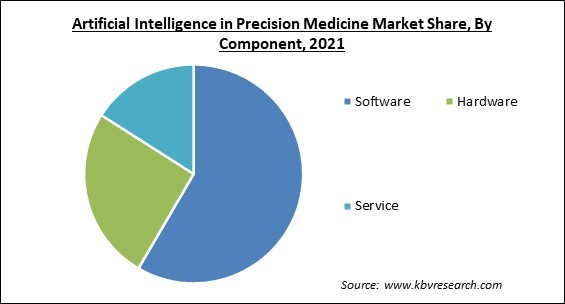
Based on components, the market is divided into hardware, software, and services. In 2021, the services segment held the substantial revenue share of the market. The high growth of the segment is accountable to the fact that the burden on healthcare practitioners is increasing at a very rapid pace, owing to which they are increasingly outsourcing various services. Despite the challenges of labor shortages and rising imaging scan volumes, AI in medical diagnosis provides health professionals with a competitive advantage over their competitors. This factor is fueling the growth of this segment of AI in the Precision Medicine market.
Based on application, the Artificial Intelligence in Precision Medicine Market is classified into Oncology, Cardiology, Neurology, Respiratory, and Others. With the largest revenue share in 2021, the oncology sector led the market. The use of AI in oncology facilitates quicker and more precise cancer diagnosis, improving patient outcomes, and is anticipated to drive segment growth throughout the anticipated period. Two key elements that will contribute significantly to the expansion of the oncology segment are the expanding healthcare infrastructure and the rising incidence of cancer.
| Report Attribute | Details |
|---|---|
| Market size value in 2021 | USD 899.6 Million |
| Market size forecast in 2028 | USD 6.3 Billion |
| Base Year | 2021 |
| Historical Period | 2018 to 2020 |
| Forecast Period | 2022 to 2028 |
| Revenue Growth Rate | CAGR of 32.6% from 2022 to 2028 |
| Number of Pages | 255 |
| Number of Tables | 381 |
| Report coverage | Market Trends, Revenue Estimation and Forecast, Segmentation Analysis, Regional and Country Breakdown, Market Share Analysis, Competitive Landscape, Companies Strategic Developments, Company Profiling |
| Segments covered | Component, Technology, Application, Region |
| Country scope | US, Canada, Mexico, Germany, UK, France, Russia, Spain, Italy, China, Japan, India, South Korea, Singapore, Malaysia, Brazil, Argentina, UAE, Saudi Arabia, South Africa, Nigeria |
| Growth Drivers |
|
| Restraints |
|
Based on regions, the Artificial Intelligence in Precision Medicine Market is categorized into North America, Europe, Asia Pacific, and LAMEA. In terms of revenue share, North America dominated the worldwide AI in the precision medicine market in 2021. Increased R&D expenditures and rising demand for precision pharmaceuticals are driving the market's expansion in the area. Collaborations between significant companies are further encouraging growth.
Free Valuable Insights: Global Artificial Intelligence In Precision Medicine Market size to reach USD 6.3 Billion by 2028
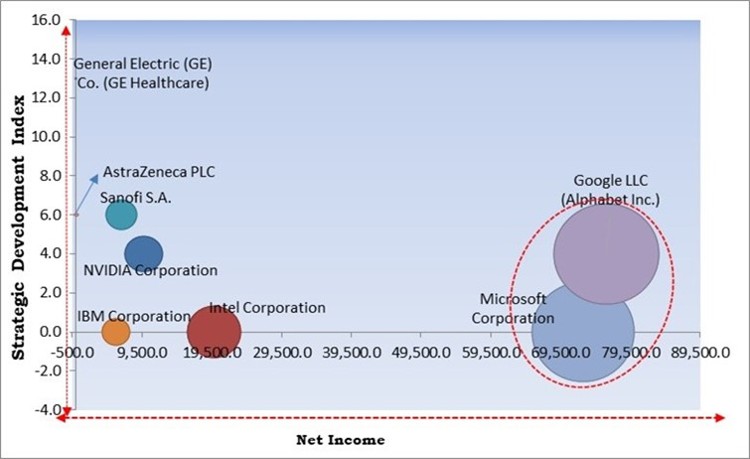
The major strategies followed by the market participants are Partnerships. Based on the Analysis presented in the Cardinal matrix; Google LLC (Alphabet Inc.) and Microsoft Corporation are the forerunners in the Artificial Intelligence In Precision Medicine Market. Companies such as Intel Corporation, NVIDIA Corporation, Sanofi S.A. are some of the key innovators in Artificial Intelligence In Precision Medicine Market.
The market research report covers the analysis of key stake holders of the market. Key companies profiled in the report include General Electric (GE) Co. (GE Healthcare), Sanofi S.A., NVIDIA Corporation, Intel Corporation, Microsoft Corporation, IBM Corporation, Google LLC (Alphabet Inc.), AstraZeneca PLC, and Tempus, Inc.
By Application
By Component
By Technology
By Geography
The global Artificial Intelligence In Precision Medicine Market size is expected to reach $6.3 billion by 2028.
Innovations In Cancer Biology Technology are driving the market in coming years, however, High Costs Associated With Precision Medicines Pose A Major Challenge restraints the growth of the market.
General Electric (GE) Co. (GE Healthcare), Sanofi S.A., NVIDIA Corporation, Intel Corporation, Microsoft Corporation, IBM Corporation, Google LLC (Alphabet Inc.), AstraZeneca PLC, and Tempus, Inc.
The expected CAGR of the Artificial Intelligence In Precision Medicine Market is 32.6% from 2022 to 2028.
The Software segment acquired maximum revenue share in the Global Artificial Intelligence in Precision Medicine Market by Component in 2021 thereby, achieving a market value of $3.6 billion by 2028.
The North America market dominated the Global Artificial Intelligence in Precision Medicine Market by Region in 2021, and would continue to be a dominant market till 2028; thereby, achieving a market value of $2.1 billion by 2028.
Our team of dedicated experts can provide you with attractive expansion opportunities for your business.
